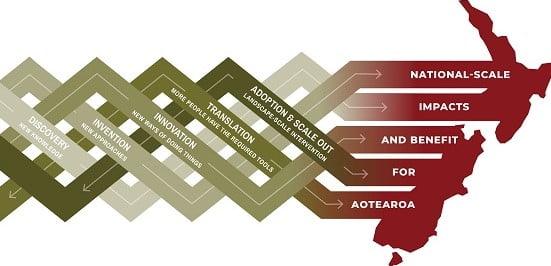1. What are scoping groups?
Our scoping groups are made up of 8-10 people who represent a range of relevant research expertise, aligned disciplines and knowledge systems (as much as practicable). We’ve chosen people who have a variety of backgrounds and work experience, but they bring their own skills and views and don’t represent the views of their organisation.
2. Why do we need them?
We currently have a system where the public are not informed enough to take action; there are critical knowledge gaps; and there are poor links within research, and between science and action.
We need diverse individuals and institutions with different roles and skills working at different stages along a value chain from science to better outcomes.
There is no single solution and we need to get better and faster at going from science discovery to impacts – at scale.
3. What do the scoping groups do?
At Stage 1, each scoping group is working through a 5-day facilitated process. These are spread over two sets of two-day workshops, as well as a final day ‘investment pitch’ to a panel of mock investors. There is also be outreach work outside of those workshops.
Participants are part of a creative process focused on identifying what needs to be done better or differently in the current system, unconstrained by existing policies, investments, or resource limitations.
These changes to the system will be reflected in goals to be achieved by 2024, which is the end of Tranche 2 of the National Science Challenges.
The design process will facilitate the groups to:
- Map the current environment for a given Strategic Outcome
- Identify partnerships and critical relationships needed to create greater impact from science investment
- Co-design goals to be achieved by 2024
- Outline how the 2024 goals will be achieved
They are expected to use their networks and connections to bring other views to the table by consulting widely with many researchers doing similar work, mātauranga knowledge holders, and industry and government stakeholders. Their networking is a crucial part of the group’s responsibility.
4. Why is it taking so long?
Because we want to get it right. Research scoping and design is a complex piece of work and has taken longer than anticipated. However, putting in the groundwork now will have a stronger likelihood of resulting in better long-term outcomes (as is often the case for large complex projects).
